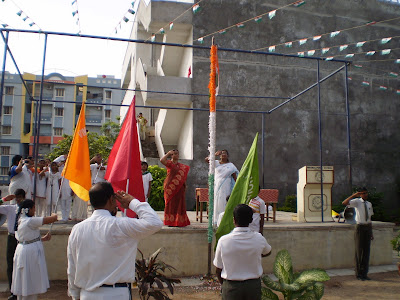CCE-A change for the good
Central Board of Secondary Education (CBSE) has introduced a new scheme of Continuous and Comprehensive Evaluation popularly known as CCE for class IX and class X. The first batch of students under the new scheme would be taking their Summative Test II (Board Exams) in March 2011. The system which is similar to that of Semester system will shortly be introduced right from class VI onwards.
As the system is new to many, I deem it fit to keep the parents and students informed through our magazine, as to how the system works. Continuous and Comprehensive Evaluation (CCE) refers to a system of school-based evaluation of students that covers all aspects of students’ development. It is a developmental process of assessment which emphasizes on two fold objectives. These objectives are continuity in evaluation and assessment of broad based learning and behavioural outcomes on the others.
In this scheme the term `continuous' is meant to emphasise that evaluation of identified aspects of students `growth and development' is a continuous process rather than an event, built into the total teaching-learning process and spread over the entire span of academic session. It means regularity of assessment, frequency of unit testing, diagnosis of learning gaps, use of corrective measures, retesting and feedback of evidence to teachers and students for their self evaluation.
The second term `comprehensive' means that the scheme attempts to cover both the scholastic and the co-scholastic aspects of students' growth and development. Since abilities, attitudes and aptitudes can manifest themselves in forms other then the written word, the term refers to application of variety of tools and techniques (both testing and non-testing) and aims at assessing a learner's development in areas of learning like Knowledge , Understanding/Comprehension, Applying, Analyzing, Evaluating and Creating.
The system aims at transforming the teaching into a learner-centred activity. It emphasizes on thought process and puts and end to rote learning (learning by heart). CCE will not only reduce the stress students’ experience, but will also help them identify at regular intervals the areas of learning, which require improvement. As this step will be initiated from the beginning of the academic session, students will have enough time to adopt suitable remedial measures and improve performance.
In this system a school session is divided into two terms:
First term – April to September. Second term – October to March.
The first term has two Formative Assessments (FA) of 10 marks each and one Summative Assessment (SA) of 20 marks. The second term has two Formative Assessments (FA) of 10 marks each and Summative Assessment (SA) of 40 marks. The syllabus covered in the first term will not be included in the second term. Thus, the Summative Assessment II (BOARD EXAMS) of Class X will have a weightage of only 40% marks.
Formative assessment includes all types of tests, formal and informal. Assessment can be done during the teaching process or after completing a unit. It includes class work, quizzes, worksheets, assignments, group discussion, experiments, projects, etc.
The Summative Assessment is the most traditional way of testing that is paper pen test based on the curriculum taught during the specified time period. The question paper of Summative Assessment is set and sent by the CBSE both for class IX and X.
The performance of a child in scholastic area will be assessed in terms of marks. Marks will be known to the student but his
report card will show grades only. Marks will be converted into grades .
All Co-scholastic areas will be assessed term wise and the teachers will maintain student wise record along with relevant descriptive indicators before awarding the final grade. Each student needs to participate in one activity or the other. Grades will be awarded on a 5 points scale.
The newly introduced system, however, seems to have had a mixed reaction from parents, students and teachers. While some hail it as a welcome and long overdue step, there are others who feel that the stress has not really reduced, but changed form. But, CCE in my opinion is the most positive, historic, dynamic change that has ever been introduced into the annals of education in India. It is child-oriented, child-friendly and child-focused.
No more do students need to learn by rote long answers and reproduce them in the answer sheets in the Unit Tests and Terminal Exams. They don’t need to be filled with tension before the Board Exams with a fear that they may not perform well.Now, they are given many chances of improvement in an evaluation for a subject, at the formative stage by way of Formative Assessment. CCE is a fun-based learning and has life- long utility as what is learnt by doing is everlasting. It is perhaps the most historic change that has been introduced in the Indian education system.
A change for the good !! Are you ready ?!!








 Independence Day at school was celebrated with the usual gaeity and enthusiasm. We had the regular March Past, Pyramid formation, Patriotic songs, speeches, etc. An unusual feature this year was that many Ex-students (more than 30) turned up for the celebrations. They said that they were badly missing their Almamater. Kudos to WPS!!!
Independence Day at school was celebrated with the usual gaeity and enthusiasm. We had the regular March Past, Pyramid formation, Patriotic songs, speeches, etc. An unusual feature this year was that many Ex-students (more than 30) turned up for the celebrations. They said that they were badly missing their Almamater. Kudos to WPS!!!




 SRI. RAJESHWAR RAO GARU,Chairman, Ekasila Education Society
SRI. RAJESHWAR RAO GARU,Chairman, Ekasila Education Society


